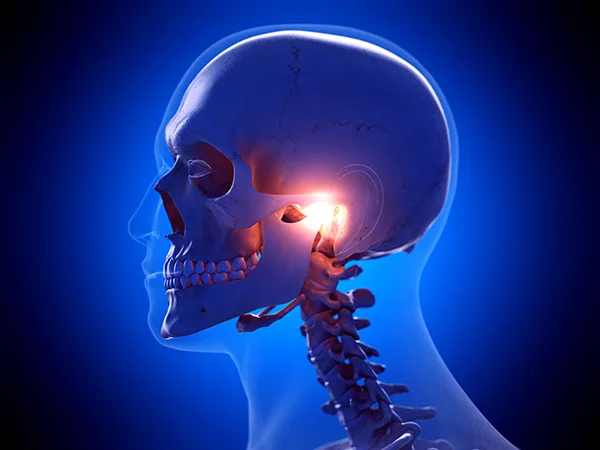TMJ
Dentist McHenry, IL
 The temporomandibular joint (TMJ) connects the jawbone to the skull and can sometimes be affected by TMJ disorder (also called TMD). TMJ/TMD has a number of different symptoms and, because it is a category of disorders rather than one specific disorder, diagnosis may take some time. However, we are able to provide a diagnosis and various treatment options at McHenry Smile Center. Treatments include medication, therapies, surgery, and self-care. The temporomandibular joint (TMJ) connects the jawbone to the skull and can sometimes be affected by TMJ disorder (also called TMD). TMJ/TMD has a number of different symptoms and, because it is a category of disorders rather than one specific disorder, diagnosis may take some time. However, we are able to provide a diagnosis and various treatment options at McHenry Smile Center. Treatments include medication, therapies, surgery, and self-care.
Symptoms and Diagnosis
TMJ/TMD is most often caused by another condition known as bruxism, or teeth grinding during the night. With this disorder, common symptoms include tooth and jaw pain, cracking or a clicking noise, headaches, fatigue, lockjaw, and difficulty chewing.
Generally, our dentist will be able to develop a treatment plan for you based on symptoms. However, for more complex cases, follow-up testing may be needed. For instance, we may order diagnostic imaging tests such as x-rays, CT scans, and MRI’s. We can also perform an arthroscopy, which is a minor surgical procedure during which we can insert a small tube and camera into the jaw. This allows us to look at the internal tissues and check the extent of the damage.
Medication and Therapy
There are three types of medication our dentist may prescribe for this disorder; pain relievers or anti-inflammatories, anti-depressants, and muscle relaxants. Anti-depressants can be used for pain from teeth grinding, since it sometimes relates to anxiety and fatigue.
Various traditional and alternative therapies may be recommended as well. The most common is oral appliance therapy, such as a mouthguard. This helps to control teeth grinding and relieve tension in the jaw. Other therapies include physical therapy, counseling (for anxiety relief), acupuncture, and biofeedback, which helps to monitor muscle tension.
Surgery
We have three main types of surgery available for TMJ/TMD; arthrocentesis, modified condylotomy, and open-joint surgery. Arthrocentesis is a way to flush the joint of inflammatory debris. We insert fluid into the joint through small needles in order to reduce inflammation. Modified condylotomy is a mandible surgery to treat pain and lockjaw. Open-joint surgery is the most extensive. This is a way to repair any structural issues that are present in the joint.
In addition, we can also order a series of injections, such as corticosteroids or botox. These can help strengthen and relax the muscles and relieve pain.
Self-Care
During your appointment, we will also explain various self-care techniques that you can use to alleviate symptoms. This includes both over-the-counter pain medication and lifestyle changes. For instance, we tell many TMJ/TMD patients to avoid sticky or chewy food, including chewing gum. This prevents excess use of the jaw joint. We may also recommend using ice, a heating pad, and self-massage to reduce inflammation and relax the muscles.
You will likely require multiple treatments to fully resolve TMJ/TMD symptoms. We may also need to try several treatments before we find one that works perfectly for you since diagnosis can be somewhat difficult with this disorder. It is critical that you follow instructions exactly as they are given in order to prevent more serious damage in the future. For additional information on TMJ/TMD, call (815) 578-1000 today. |